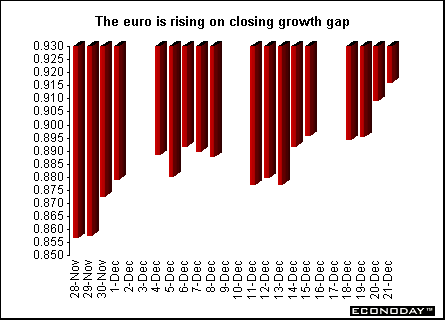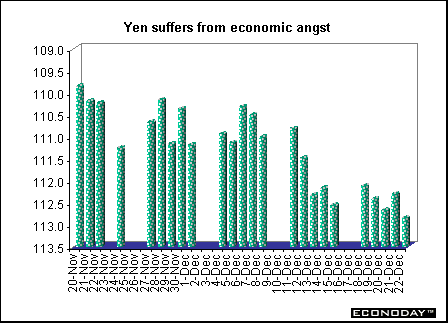
Currencies
The euro is hovering near a 15 month high against the dollar based on the narrowing growth gap between the United States and EMU. Concerns about U.S. economic growth, the decline in equities markets and uncertainty regarding the abilities of appointees to Bush's cabinet continued to weigh on the dollar.

The higher euro (lower dollar) has implications for trade on both sides of the Atlantic. For the United States, the higher euro means that U.S. exports will be more competitive in European markets. Conversely, EMU exports would slip (and especially Germany's) because their products would be more expensive. The current expansion has been driven primarily by exports, thanks to the cheap euro. The implication here for the EMU is how much growth lost from declining competitiveness will be made up by increased domestic demand. European companies that make everything in Europe and sell 40 or 50 percent of their products in the United States will see profit margins fall as the euro gains against the dollar. That will make European exports to the U.S. less competitive and cut the value of dollar earnings for European companies.
Analysts said heavy selling of U.S. equities prompted the latest rise, which has left currency markets awash with dollars and investors looking for a safe haven. But there is also the uncertainty of whether the new U.S. administration will back the dollar as strongly as the outgoing Clinton administration. President elect Bush named industrialist Paul O'Neill as his treasury secretary on Wednesday, a choice that analysts said will not assure markets to the same extent as a Wall Street name.
The yen fell to a nine month low against the euro and to near a 16 month low against the dollar on concern that Japan's economy is stalling. The world's second biggest economy grew 0.2 percent in the third quarter with prospects that the figure probably will be revised down. Slowing growth weighs on the yen as it makes assets held in the Japanese currency less attractive.

The Bank of Japan is pumping more funds into the country's money market than in the same period last year - cash that may help banks keep lending while the stock market slides. Japanese banks typically prepare a lot of cash at the end of the year because depositors withdraw a large amount ahead of the New Year holiday. By pouring money into the market, the Bank also is helping allay the concerns of some investors that the economy is losing steam and may even shrink next year.
Japanese major banks will probably be forced to postpone disposal of bad loans because of falling stock prices. Banks were able to write off a total of 1.6 trillion yen in bad debt during the six month period ended September thanks to unrealized profits from stock and bond holdings.


Introduction • Global Stock Market Indexes • Recap of Global Markets • Currencies • Indicator Scoreboard

The Bottom Line • Looking Ahead
© Econoday, 2000. All Rights Reserved.
|